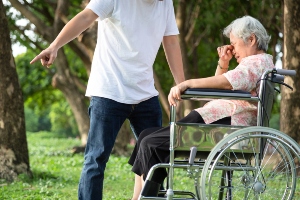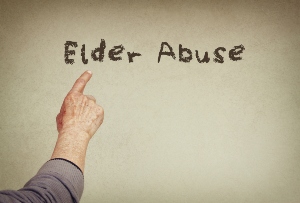What IS elder abuse?
The Centers for Disease Control & Prevention defines elder abuse as “an intentional act or failure to act that causes or creates a risk of harm to an older adult” (age 60 or older).
- Perpetrators of elder abuse include children, other family members, and spouses—as well as staff at nursing homes, assisted living, and other facilities.
- Nursing home abuse is any form of abuse that comes to a resident living in a long-term facility where the perpetrators are staff members, nurses, and even other nursing home residents
- Elder abuse often occurs when another adult family member lives full-time at home with the older person.
When caregivers knowingly, intentionally, or negligently act in a way that causes harm to elderly adults who are weak and vulnerable, this constitutes abuse.
Is Your Loved One Suffering Elder Abuse?
Abuse, including neglect and exploitation, is experienced by about 1 in 10 older adults who live at home. From 2002 to 2016, more than 643,000 older adults were treated in the emergency department for nonfatal assaults and over 19,000 homicides occurred.
 Potential Elder Abusers
Potential Elder Abusers
Elder abuse is frequently caused by those known to and trusted by older adults, such as family members, caregivers, friends, loved ones, service providers, and peers. Abusers can be anyone, of any age, race, or socioeconomic status.
Types of Elder Abuse
Abuse can take many forms.
Physical – illness, injury, functional impairment, or death resulting from the intentional use of physical force. Examples include hitting, kicking, or pushing which typically results in bruises, lacerations, and broken bones.
Emotional/Psychological – refers to verbal or nonverbal behaviors that inflict distress, mental pain, fear, or anguish. Signs to look for include humiliation, threats, harassment, withdrawal, sudden personality changes, and emotional outbursts.
Basic neglect involves the refusal or failure to provide adequate necessities such as food, water, shelter, clothing, hygiene, and essential medical care (i.e., basic needs), which can ultimately result in health conditions such as ulcers, malnutrition, bedsores, and untreated infections.
Financial – is the illegal, unauthorized, or improper use of money, benefits, property, or assets for the benefit of someone other than the older adult.
Sexual – involves any form of sexual harassment or any sexual act that is forced, non-consensual, or unwanted. Look for signs such as bruising in the genital area and torn or bloody clothing.
Abandonment – is a form of neglect that goes beyond, where abusers intentionally desert vulnerable seniors who depend on their care leaving them with little or no assistance.
NEED ADDITIONAL INFORMATION?
- Find blog articles related to Nursing Home Abuse & Neglect
- Signs of Abuse & Neglect
- Case Results
When Should You Take Action?
Elder abuse impacts communities on many levels, including personal relationships, community engagement, and public health, safety, and economic domains. It is a serious issue and can be devastating.
If abuse/neglect is being committed by a family member or trusted loved one, victims may not know how to properly take action. However, another family member can report the abuser on the victim’s behalf.
 Educate yourself on the signs of elder abuse. Be observant of your loved one and if you believe abuse is happening put a stop to it immediately. Document whatever you can and talking with a lawyer can help you assess the need for a formal investigation or other legal action.
Educate yourself on the signs of elder abuse. Be observant of your loved one and if you believe abuse is happening put a stop to it immediately. Document whatever you can and talking with a lawyer can help you assess the need for a formal investigation or other legal action.
Need to report abuse or find services for older adults?
Report elder abuse or find services for older adults and their families by visiting The Eldercare Locator. You can also access the Locator by calling 1-800-677-1116. The Eldercare Locator is a public service of the U.S. Administration on Aging.
Missouri’s Adult Protective Services program helps eligible adults who require assistance with abusive, neglectful, or exploitative situations. We offer intervention, education, and prevention services along with supportive resources. Adult Abuse & Neglect Hotline 1-800-392-0210
Questions? Our knowledgeable staff is available at (877) 284-6600.
Legal Help for Elder Abuse Victims
If you believe that your elderly loved one is being abused by his or her caregivers, the first step is to relocate him or her to a safer environment and then seek legal guidance.
The attorneys at Nash & Franciskato are your advocates and the voice for your elderly family member, fighting to stop his or her pain and suffering.
Our personal injury legal team gives you:
- Over 80 years of combined experience
- Trusted legal advisor committed to your needs
- Super Lawyers for over 10 years
- The AV Preeminence Rating for Ethical Standards & Legal Ability
- Compassionate advocacy for you and your family
Contact us at (877) 284-6600 for a free, no-obligation case evaluation.
 Receive a Free Evaluation from Experienced Elder Abuse Attorneys
Receive a Free Evaluation from Experienced Elder Abuse Attorneys
The attorneys at Nash & Franciskato have experience handling elder abuse and nursing home abuse lawsuits. We will review the circumstances of your loved one’s treatment and provide guidance on your legal options. We want to help protect his or her rights. Contact us for a free no-obligation review of your case.
Contact us for a Free Review of Your Case
Sign up for our Email
If you would like to receive news and blog updates regularly, sign up to receive our email newsletter. Your email address will only be used to send you our newsletter and respond to inquiries.
Editor’s Note: This post was originally published on April 18, 2016. It was reviewed on June 5, 2023, and updated for content and accuracy, and again on January 20, 2025, and republished.
